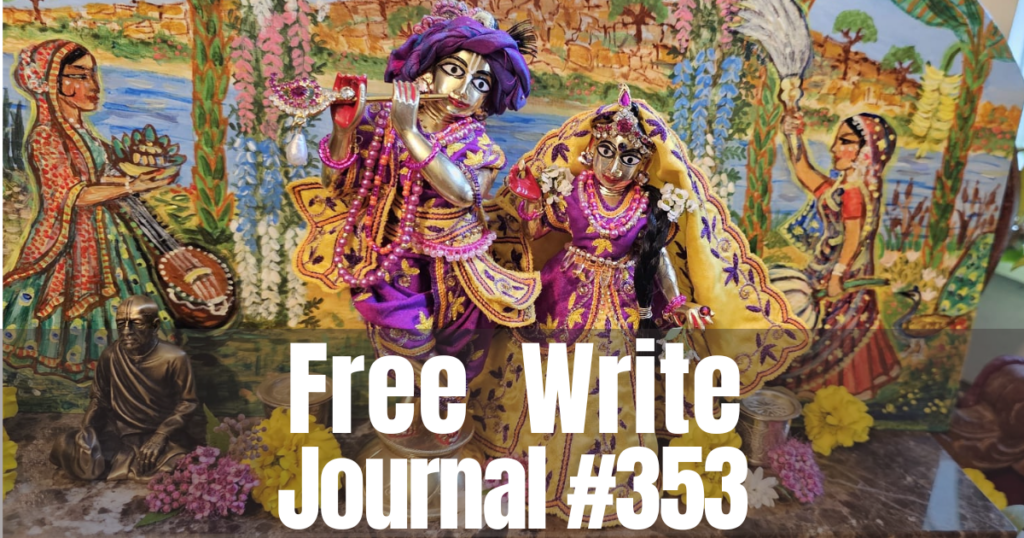
Satsvarupa dasa Goswami Maharaja
Spiritual Family CelebrationSaturday, July 5, 2025
What
Meeting of Disciples and friends of SDG
Where
The Veterans of Foreign Wars Hall
845 Hudson Avenue
Stuyvesant Falls, New York 12173There is plenty of parking near the Hall. The facility is just a few minutes’ walk from SDG’s home at 909 Albany Ave.
Schedule
10:00 – 10:30 A.M. Kirtana
10:30 – 11:15 A.M. Presentation by Satsvarupa Maharaja
11:15 – 12:30 P.M. Book Table
12:30 – 1:15 P.M. Arati and kirtana
1:15 — 2:15 P.M. Prasadam FeastContact
Baladeva Vidyabhusana at [email protected] or (518) 754-1108
Krsna dasi at [email protected] or (518) 822-7636SDG: “I request as many devotees as possible to attend so we can feel the family spirit strongly. I become very satisfied when we are all gathered together.”
******
Śrī Caitanya-caritāmṛta, Madhya-līlā 20.124–125: “O great learned devotee, although there are many faults in this material world, there is one good opportunity—the association with devotees. Such association brings about great happiness. . . . .”
Srila Prabhupāda: “Therefore, our Society is association. If we keep good association, then we don’t touch the darkness. What is the association? There is a song, sat-saṅga chāḍi’ kainu asate vilāsa, te-kāraṇe lāgila mora karma-bandha-phāṅsa (Gaurā Pahū, verse 3). Sat-saṅga. Sat-saṅga means association with the devotees. So the one poet, Vaiṣṇava poet, is regretting that, ‘I did not keep association with the devotees, and I wanted to enjoy life with the nondevotees. Therefore I’m being entangled in the fruitive activities.’ Karma bandha phāṅsa. Entanglement.” [Conversation with David Wynne, July 9, 1973, London]
This week showed a slow decline in energy and an increase in headaches, culminating in a urinary tract infection (UTI). So once again Satsvarupa Maharaja is taking antibiotics and fighting off the buggies. Cranberry juice and other potions don’t seem to work for him so well. He just has to tolerate it and push on.
Hari Hari,
Baladeva
If you would like to help, please contact Kṛṣṇa-bhajana dāsa at [email protected] or [email protected] and we will find you a service that utilizes your talents.
Krsna’s power and attraction is greater than maya’s, so although it is not easy for the mind, we have to coax him, sometimes sternly, and preach to him about the wonderful effects that will come from hearing the holy name in faith. So manah-siksa, to instruct and pray to the mind is a central part of japa.
One way to practice manah-siksa is to talk to the mind during japa (or at other times) and ask his full cooperation. We also have to ensure that the mind does not become absorbed in other things, either during the japa hour or during the day. We have to protect our minds from mundane engagement. Then, if we become enough of a friend of our mind, we can become aware of our mental activity. We can become conscious. The mind will begin to signal to us: “Now I am thinking nonsense, now I am chewing the chewed. What are you going to do about it?” When the mind gives that signal, then we can immediately preach to our minds: “Wake up! Hear the holy names!” Therefore, dear friends, let’s follow the previous acaryas and instruct our minds in a friendly way, always conscious of the goal we want to attain—attentive, devotional chanting.
******
Before leaving this place, I will give a Bhagavatam class at the preaching center. I have picked some First Canto verses where Vyasadeva expresses his dissatisfaction after having compiled the Vedas. The author who compiled all the scriptures for the welfare of humankind was still not satisfied in his mind. “This may be because I did not specifically point out the devotional service of the Lord, which is dear both to perfect beings and to the infallible Lord” (Bhag. 1.4.31). Just as Vyasa thought this, his guru, Narada, arrived.
That is the story of my japa retreat.
******
A late morning slough, with a couple of rounds taking twelve minutes each. He shouldn’t have served us that pudding for breakfast, but then I didn’t have to eat it; I could have pushed it aside in favor of late morning alertness.
Embarrassing because one wanted to make a sterling, last-day performance. No such luck. Anyway, who am I trying to convince? This isn’t an audition for a Broadway show. And this is not the last day. Slowly, I may learn by my mistakes. But who has enough time to waste a few mornings in a mental bog?
******
The themes I thought of during japa—they could make a wild, surreal movie. I wouldn’t even be able to remember them if I tried.
Here is a statement on japa from a letter by Prabhupada to Satsvarupa dasa, March 8, 1969. Satsvarupa had written to Prabhupada saying that he had heard from a Godbrother that Prabhupada was chanting japa and a disciple was present who was also chanting. Supposedly, Prabhupada told the disciple, “Japa should be chanted very softly.” Satsvarupa asked Prabhupada if this was true. Here is the reply:
“Regarding your question, there is no such requirement that japa should be silently and chanting should be done differently. Loudly or silently, everything is all right. There is no such restriction. Only thing is that we should chant very attentively, hearing the vibration very distinctly.”
That last sentence has been a motto for me for the last few days. I keep going back to it, telling myself, “Chant very attentively, Prabhupada says, and hear the vibration distinctly.” That is what he wants us to do.
******
Overcast day. Tractor noisy in the fields. It’s warmer. This is not the last day. Chanting Hare Krsna will continue.
Tiny bugs with twin antennae land on my saffron cotton lap. I chant to them. Tiny bluebell wildflowers, I chant to you. This is better chanting.
******
Never doubt the importance of chanting your sixteen rounds. A “maha-vakya” instruction from Srila Prabhupada is as follows:
“Of all the regulative principles, the spiritual master’s order to chant at least sixteen rounds is most essential” (C.c., Madhya 22.113, purport).
And there are many other statements to indicate that chanting sixteen rounds is a must for sincere followers of Srila Prabhupada.
“It is essential, however, that everyone fulfill a specific vow to chant the Hare Krsna mantra. Therefore, we have prescribed in our society that all our students must chant at least sixteen rounds daily” (C.c., Adi 10.43, purport).
pp. 1083-85
The Ratha-yatra procession, with its three fifty-foot-tall carts, began at Grand Army Plaza on Fifth Avenue and proceeded downtown. Young men, girls in saris, Indians, New Yorkers—hundreds— tugged at the ropes, pulling the gigantic chariots. With silken towers billowing yellow, green, red, and blue in the wind, slowly and majestically, the carts sailed south. The parade was complete with beautiful weather, hundreds of chanting and dancing devotees, and thousands of onlookers. And the route was some fifty blocks down Fifth Avenue, “the most important street in the world,” to Washington Square Park.
At Thirty-fourth Street Prabhupada joined the procession. As he came forward to board the chariot of Subhadra, the devotees converged around him, amazing the policemen and other onlookers with their spontaneous adoration of Krsna’s representative. Although the inner meaning of Ratha-yatra is the gopis‘ desire for Krsna to return to Vrndavana, these devotees were more absorbed in Srila Prabhupada’s return to New York.
It was a gorgeous, appropriate climax to Prabhupada’s ten years of preaching in New York City. When he had first come he had had no money, no place of his own to live, and no place for people to congregate and hear about Krsna. Now he was riding in splendor down Fifth Avenue at the Ratha-yatra festival, and his Radha-Govinda Deities had a skyscraper. In 1965 he had been alone on the street, but now he was accompanied by six hundred disciples, loudly singing the holy names and benefiting millions of conditioned souls.
In front of Subhadra’s cart walked Jayananda, holding the steering tongue, keeping the cart on course. As Prabhupada sat comfortably on the cart he fondly glanced at Jayänanda from time to time. Jayananda, steering with his left hand, would hold his right hand upraised, cheering Prabhupada’s Ratha-yatra and rallying the others to pull the ropes and chant Hare Krsna.
When the procession arrived, Washington Square Park was crowded with people. A temporary stage had been erected, and Srila Prabhupada and the Deities took their places. Kirtanananda Swami introduced Prabhupada before the crowd, and Prabhupada stood up to speak. Beginning by explaining the significance of Ratha-yatra, Srila Prabhupada told the story of how the Jagannatha Deities were carved at the request of the king of Orissa over two thousand years ago. When the king had disturbed the sculptor before the Deities were completed, the sculptor had left. “But the king decided, ‘I shall worship this unfinished Deity, never mind.’ So the devotee is offering,” Prabhupada continued, and Krsna accepts… if it is offered with love and affection. He says in the Bhagavad-gita, patram puspam phalam toyam/ yo me bhaktya prayacchati. Krsna says anyone who offers Him a little flower, a little water, a little fruit with love and affection, “I eat them, I accept them.” That means that even the poorest man in the world can worship God. There is no hindrance— ahaituki apratihata—devotional service cannot be checked by any material condition. There is no restriction of caste or creed or country, nation. Anyone can worship the Supreme Personality of Godhead, according to his means.
And our Krsna consciousness movement is a propagation to teach people how to worship the Supreme Personality of Godhead. This is our mission, because without relationship with God, without reviving our eternal affinity with God, we cannot be happy.
All living entities, Prabhupada explained, are children of the supreme father, Krsna, or God. But only in the human form of life can one understand his relationship with God. If one misuses his life and doesn’t understand his duty to Krsna, then his life is spoiled.
“So please do not take this Krsna consciousness movement as any sectarian movement. It is the science of God. Try to understand the science of God. Either you accept it directly, or you try to understand through philosophy and science. We have got so many books. Kindly take advantage of this movement, why we are distributing so many literatures. Soberly and with calm head, try to understand this movement. This is our only mission. Thank you very much.”
As Srila Prabhupada left to return to the temple, prasadam distribution began and the dramatic actors prepared to go onstage with their rendition of “Kali and His Consort, Sin.”
In the evening the parade and festival received good coverage on all major TV stations, and the next morning, pictures and articles appeared in the newspapers. Prabhupada particularly liked the New York Daily News centerspread, where several photos bore a large caption: “Fifth Avenue, Where East Meets West.”
“Send this cutting to many places,” Prabhupada said. “Send it to Indira Gandhi. This title is very nice. This is the point. “East meets West.’ As I always say, the lame man meets the blind man. Together they do wonderful, and apart they cannot do anything. He is lame, and he is blind. But if they join together—Indian culture and American money—they will save the whole world.”
Srila Prabhupada heard from the New York Times article, which stressed how the parade included hundreds of Indians “who were pleased to see they could keep faith even in New York City.” The article quoted “an Indian immigrant” as saying, “We love New York City, America. It’s the most beautiful place in the world. No other country will give such freedom for our own ceremony.”
“That’s a fact,” Prabhupada said. “That I always say. The Times first published about my activities when I was in Tompkins Square Park.” At the festival site, prasadam had been served to seven thousand people. And even when the devotees had walked back uptown with the carts late at night, hundreds of people had followed and chanted. The devotees were already talking about how to improve the festival for next year. They could have a press box, and Prabhupada suggested they rent a small building downtown and call it Gundica. Lord Jagannatha could stay there for one week. Then the devotees should have another procession and festival with Lord Jagannätha returning to the temple on Fifty-fifth Street.
“Last night,” said Tamala Krsna Goswami, “all night we were cleaning up the grounds at the park. So one woman who lives next to the park said, ‘In all my years of living here I’ve never seen such a wonderful festival held.’ And on CBS television, the official who’s in charge of the park said, ‘We are very proud to be able to say that this park was founded hundreds of years ago when America was religious and that spiritual life is still present in Washington Square Park.'”
pp. 23-26
Lord Krsna says He is the transcendental chant, the father of the universe, the mother . . . The pure devotees seek Him out directly, satatam kirtayanto mam. They are fully absorbed in glorifying Him. Why should we do less? We don’t want to be considered among the “others,” such as the impersonalists. Follow the path of praising Krsna with a firm vow to follow the rules and regulations, to bow down, to offer worship to the Supreme.
Do I do it? Is this an ideal I cannot yet reach? Is my writing fated to be something less? Let it climb, the devotional creeper. Let me sing with voice and pen. Free-writing, free expression—in Krsna consciousness. Yes, yes.
Calm, fairly calm. We’re at a house in Italy. It’s early Saturday morning. Cars pass regularly as people go home from their late-night Friday. I seek peace but should know I can’t have it in this material world. I can’t have it, but I can have an abiding spiritual peace. Those who know Krsna as the object of sacrifice, the Lord of all planets, as everyone’s best friend can attain “peace from the pangs of material miseries.” (Bg. 5.29) Confidential knowledge of Krsna grants relief from miseries. Therefore, it’s not wrong to seek peace and solace and relief—and even quiet—but it is not possible to attain them by material means. You can’t get them just by living in the countryside.
Madhu and I will drive all day today in order to arrive in Slovenia by nightfall. We are going to the ISKCON temple there, which is in a city whose name I don’t know how to pronounce. Thugs sometimes attack the ISKCON temples in such countries. Such temples—all our temples—are filled with strife as devotees struggle to work with one another with their not-always-perfect motives.
And so, my friend, will you write out of your head and hand and headache? Will you tell us of your journey? It’s certainly summer—sweaty, hot, mosquitoes biting all night.
Yes, I will tell you of this journey, and even when I can’t think of something edifying to say, I’ll continue to speak because I continue to live. My heart beats.
My material father is dead; he died eight years ago of a heart attack. The news reached me only a few days ago. It happens. Was he thinking of God? Was he even my father? Krsna is the ultimate father. The spiritual master is my real father. My master, father, teacher is Srila Prabhupada, and I can continue my relationship with him even after his departure from this world.
Taste of mosquito repellent on my tongue. When I get bewildered by outer events, I’ll try to gain hold of inner Krsna consciousness.
Last night I had a nightmare. Cruel persons were torturing me in various ways. That’s the material world. Whatever suffering I experience in dreams or otherwise is only token karma for my past sinful life. I want to use it as an impetus to surrender to Krsna. Headaches are like that, and highway delays, inconveniences, mishaps—all challenges placed before this soul in his attempt to reach Krsna’s lotus feet.
Should we not be perfect before God? God knows our hearts. I am speaking—writing—it might be said, just to keep myself busy. It’s something I do to pass the time. I dig up things, show off, say I seek to go beyond pretense and to fmd myself, the pure self, as eternal servant of the Lord. As Srila Prabhupada writes (and I want to repeat), the devotee aspires to gain his eternal association with Krsna in one of the five transcendental rasas. That’s it. We are seeking Krsna consciousness in this summer marathon record.
Toot-toot. Train whistle. Get into the white van. Chant or lie down as your body bumps over the miles. Think of friends and projects. How is it possible that I’ll have to leave it all?
At the end of today’s road is supposed to be a thriving temple which in the last year has recruited fifty devotees. They will see me, old Svevo, cranking into their courtyard in this white van. “We have been on the road all day. We just want to rest. See you in the morning.”
Usually we travel for only five hours a day. Today we will drive eight. I’ll try to catch a few writing times during the day. Not so external? It’s all one, external-internal. I will tell you something.
This cannot be a book written in one place with no other occupation during the day. This fact may be an advantage. I’ll try not to complain, “I’m distracted and can’t write.” If we are traveling, then give us the benefit of special road perceptions. Anything. My desire is for protection in the Lord’s energy, not outside it.
Road stops, mental jerks, ups and downs—all this and more ahead. Bumps with others. Ruffles within. Concerns of the body and its organs. Admitting the truth. Seeking the Absolute. Avoiding fault-finding.
I read in Heschel that the Kotzker wasn’t content to weed out doubts and faults; he wanted to face them. I’m not sure I agree with that procedure. If we know things are not good for us, why not weed them out, even as routine? Although it’s true that nothing should be done without thinking, some doubts have no value, no profit. What do we gain by looking too closely at them? At least we should argue with them.
We would agree with Heschel that weeding does not remove all weeds. The seeds have to be destroyed. Otherwise, mown fields rise again. Kecit kevalaya bhaktya: devotional service does the job. Ultimately, it’s not by my introspection or heroic strength that I can undeceive myself. It’s by hearing about Krsna, the Lord in my heart; He cleanses the desire for material things and delivers me pure taste in spiritual life. I plan to keep weeding. Weeding causes pain; I’ll have to cry sometimes. If at a particular moment when it’s time to write I’m filled with complaints, I may have to say, “Ouch!” although I would prefer to say, “Gauranga!”
pp. 99-104
From 10 A.M. yesterday all day I had a headache. Talked with Baladeva about strategies and ways to manage headache pain. Then finally took recourse of the one thing that I know works and that’s a lot of rest. Went to bed by 5 P.M., got up at 12. Didn’t feel like writing-drawing on the big boards. Went to my desk thinking I would free-write, then instead I wrote commentary for the last Canakya slokas. I think that finishes it now finally. The last one was, “Don’t feed milk to a snake, it only increases his poison.” When I first got up at midnight, I prepared a lecture on the importance and the pleasure of reading Bhagavatam to be given this Friday night in Baltimore at Krsna Bhakta’s house. That is, if I don’t get afflicted with one of these headaches. So let me try to think ahead of time I won’t have headache, how I’ll be all right and maybe that will help. Hare Krsna Hare Krsna, Krsna Krsna Hare Hare. I don’t have to be so much a victim to circumstances.
The snow is crunchy-crunchy from some snowfall late afternoon yesterday. Now I’m at the end of my first stretch where I face a little house. It looks just like a gingerbread house of a storybook. I can see smoke coming out the chimney and the cheery light on the front porch and the snow on the roof. Who knows, however, what maya the residents are in. Turn your back on it and start walking the other way, back into the fresh snow scene. Snow powdering on the boughs of the evergreens and the bare trees. Bare trees’ naked arms uplifting in angles from the trunk. Words can’t capture the essence.
I do like those Bhagavatam verses. So many of them you could spend a lot of time with. Just try to get near them at different times of the day even. You’ve got your cards, have verses on cards—favorite verses. The sages at Naimisaranya, Maharaja Pariksit, Sukadeva Gosvami. How important it is—our bhakti—to hear about Krsna and His transcendental activities, and damn the atheists.
This morning I also had a revival of drawing and painting with colors. I suppose I always would like to do that. If I have the energy, can just go to it. What I was doing today was just take a magic marker and start scribbling and out of the lines as they whirl around in circles and angles something starts to appear that you recognize and then you start to go with that. One I did in orange magic marker, like a lion’s muzzle came out first and that made me think of Nrsimhadeva. But then the bottom from the neck down was more like a bosomy woman. Then I thought Nrsimhadeva is a better image to develop, so I went with him and made it a kind of friendly, somewhat cartoon cuddly Nrsimhadeva. Makes me think that I tend to favor the friendly images when they come. I also want to finish it off quickly, some large, simple figure that will look attractive as a painting. That’s all right, but I think you ought to try to do it more to express the unconscious. And if a woman comes out, then finish up the woman. If something scary comes out then don’t just change it deliberately if there’s an energy there. Also if what you’re doing is scattered and doesn’t come together to make a pleasing picture, that’s not a reason also to go for some more legible image that comes out of it if you really want the paintings to be your thumb print or your image of what’s going on. But I thought, “Well, what the heck there’s nothing wrong with trying to make a nice picture and with steering it to Krsna.” So that’s okay too, but keep the other in mind if you want this to serve deeper interests, let it come out. It’s clean, it’s cold. The tree line is very dark, but above it the sky space is bright by comparison. At first it’s kind of light-ish then it turns bluish and I see a star in the sky even at this hour. Turn around, see everything, it’s so nice and soon you leave here. Hare Krsna Hare Krsna, Krsna Krsna Hare Hare/ Hare Rama Hare Rama, Rama Rama Hare Hare.
Heading around the last bend you hesitate to say the same old thing, “I see the red stop lights.” But come out with it, this is your life. Snowbound, pretty, but cold as death. Keep walking. Stay away from poison. Something looks like sled track here too. Hare Krsna Hare Krsna, somebody having fun. Back to the house and see what happens. How much time you get to serve Krsna and to read Srimad-Bhagavatam and a writing session. Hare Krsna Hare Krsna.
Too dark to see clearly
I scribble anyway
with a thumb and an opposing forefinger.
Don’t be so dumb incoherent.
Uh … I … Uh .. .
just want to say . . .
Krsna is God
and I love Him.
Words come off periphery of consciousness like snow shoveled—by whom? Krsna is God and I love Him and He loves me. He wants me to know Him and serve Him and love Him in this world and the next.
Yes, who made the world? God made it.
Who is God? Krsna, also Jehovah, Allah
Father, Abba, Christ
His son, Mohammed His prophet,
Buddha His saktyavesa-avatara.
But Krsna is supreme all-attractive, wise one who spoke Bhagavad-gita and most beautiful form—flower with aroma is Krsna, the Supreme.
And who made us?
We are eternal part and parcel
of God. How much can we know of
these mysteries?
Not everything. It is infinite and
we are infinitesimal. As He
desires, He reveals in our
hearts and that is in
proportion to our desire to
know Him and our purity
and our practice.
Question: How is it we were able to come in contact with the Lord’s pure devotee? Maybe ajnata-sukrti.
But why does one person do it and not another? Why does one get inspiration to do a favor to a Vaisnava?
That’s God’s causeless mercy.
Feet cold. Feet cold.
M. chants and it’s quite early,
6:56 TUES. 7, because I came out here early.
But I’d like to go back soon.
pp. 51-56
According to Srimad-Bhagavatam, all obstacles can be overcome by one who regularly chants and hears the message of the Supreme Personality of Godhead:
Living beings who are entangled in the complicated meshes of birth and death can be freed immediately by even unconsciously chanting the holy name of Krsna. . . . Who is there, desiring deliverance from the vices of the age of quarrel, who is not willing to hear the virtuous glories of the Lord?
Bhag. 1.1.14; 16
The Bhagavatam also speaks of cutting the knot in the heart. This knot, hrdaya-granthi, is the total of all our false attachments to the self and the world. If that knot (false ego) is untied by the Supreme Lord, then one realizes the happiness of the self.
Srila Prabhupada also used the metaphor of hurdles which appear on the path. He writes,
“The transcendental name of Krsna, even though uttered unconsciously or by force of circumstances, can help one obtain freedom from the hurdles of birth and death.”
(Bhag. 1.1.14, purport)
Chanting and hearing about Krsna is also compared to “switching on the light of pure knowledge within the heart of the devotees.” When the Supreme Himself takes charge of illuminating the heart of the devotee, then one cannot remain in darkness.
The sastras also compare the removal of material obstacles to cleaning away dirt. This is done primarily by the process of sravanam and kirtanam.
Sri Krsna, the Personality of Godhead, who is the Paramatma (Supersoul) in everyone’s heart and the benefactor of the truthful devotee, cleanses desire for material enjoyment from the heart of the devotee who has developed the urge to hear His messages, which are in themselves virtuous when properly heard and chanted.
—Bhag. 1.2.17
Who can fail to be moved by these statements? He must be stone-hearted. Who will not chant and hear the glories of the Lord, after hearing the praises of sravanam kirtanam as given in Srimad-Bhagavatam? His ears are no better than the holes snakes crawl into. His voice is no better than the croaking of the frog, who calls to attract death.
Despite the Vedic promises that Krsna removes all problems when we chant and hear, it is not uncommon for initiated devotees to become slack in these primary practices. Does this mean that the descriptions of the glories of sravanam kirtanam are false advertisements? A sincere devotee will never accept such a blasphemous statement. And yet on a personal basis, devotees sometimes have doubts whether sravanam kirtanam will actually work for them. Despite vows to chant at least sixteen rounds a day, many give it up, or reduce the required quota. The reading of Prabhupada’s books is also sometimes given up, or reduced to an occasional glance. In cases like these, it is not hard to understand that the obstacles in the path of devotional service are primarily caused by the lack of chanting and hearing. Therefore, the most dangerous obstacle of all is when we neglect the very things that brings us release from the knots in the heart.
Why do we fail to find taste, why do we lose the discipline to perform chanting and hearing as a daily duty of life? In the Hari-nama-cintamani, Bhaktivinoda Thakura analyzes this difficulty in regard to inattentive chanting of the holy names. He states that if a neophyte devotee is not very scrupulous in taking up the practices of chanting and hearing, he will quickly grow distracted, and this will produce “a type of illusion, causing serious offenses against the holy name that are very difficult to overcome.” What happens is that one simply gives up interest in the pursuit of spiritual life and turns his attention to cravings for wealth, sex and fame. “When these attractions cover the heart, the neophyte gradually loses interest in chanting of the holy name.” Realized in this way, the failure to pursue the two main practices of bhakti (sravanam kirtanam) is not due to the omission of a particular detail, and it is certainly not the fault of the process of bhakti itself. The fault is in ourselves. We have become weak-hearted, and so maya has entered once again and turned our heads. We do not want to chant and hear about the Lord because we are absorbed in sense gratification.
A good beginning for japa and reading reform is to accept this blunt analysis of why we are not interested in sravanam kirtanam. Let me admit, “I’m not interested in chanting because I have too many material desires.” This is humbling, and it is the truth. I could offer more intricate and psychological reasons, and even circumstantial explanations, excuses and rationalizations, but it is better to reach the bedrock: acceptance of our causeless unwillingness to serve the Supreme Lord. Now we will be in a better position to consider the grave dangers of material life and to recall why we were attracted to Krsna consciousness in the first place.
There will never be a clearer analysis of why we cannot chant nicely than the explanation and remedy given by Rupa Gosvami in the Upadesamrta:
The holy name, character, pastimes and activities of Krsna are all transcendentally sweet like sugar candy. Although the tongue of one afflicted by the jaundice of avidya (ignorance) cannot taste anything sweet, it is wonderful that simply by carefully chanting these sweet names every day, a natural relish awakens within his tongue, and his disease is gradually destroyed at the root.
—Nectar of Instruction, Text 7
Rupa Gosvami’s verse is worth putting on a 3″ x 5″ card in a place where we can see it every day—and not just see it, but feel it.
pp. 119-23
I’m home, we could
make beautiful music
together, couldn’t we?
This is the
way we folks are
scratching our pens
there is no way
you can forget the fear of being
a devotee and thinking
this is forbidden
it’s not the passion
I want to love You
Lord Hari and sometimes
it seems dry just
saying the names
I don’t know if You know
how much I do love You
my body is a fearful
component
he found out you
were not so good after
all.
He said Prabhupada wouldn’t
like it (gentle macho)
you couldn’t tell us
what you really wanted to
do
I suppose you could believe me
post it on the wall
Jesus Christ suffered
smoky joint be
allowed to find some fresh air
we walked around outside
of the house
old house
You’ll never be alone again
said the Eire-cell
company even in the
sunrise at seashore you
can you phone your baby.
Listen, they’ve developed it
over all these years I’ve
never been so happy
better digest some
simple food like
air before
the millennium ends and
you have to stop listening
to music.
I don’t know Krishna
in a few days it’s Radha’s
day. Please tell
me what you think.
O Krishna, I was sighing
to return here. Lone house
where we could make
beautiful music together
the bhakti-yogi is never
alone as God is in
his heart and He hears his
friends are not
take this love letter and
deposit it in the North Pole
it will still return here
post it, “No one here by
that name.”
Hare Krishna.
They are just warming up we
want something polished.
Dirty warning it could be dangerous.
Ask to be saved by…
Be sure if you can you will be saved by God, Krishna,
it’s not a hoax.
He knew, prayer meeting asking God to be kind, He already is. He’s true and the
one who came down to you.
He asked you.
I want words to be
be with Krishna it’s all right
tell your doctor
I’m okay
just drill me
I’m going to live fifty more
years to be the oldest man accused of murder.
“Such a demon never existed.”
It’s all a plot of the mobsters
I’ll be here with curling cooling late
September leaves evoke
he’s back
busy answering
mail
enough.
I got (America got) said Philip Returned to Surtsey – a letter from a devotee in a faraway place and she said it would be hard to describe how unhappy she feels. Life is being squeezed out her by the “dharma” of acting as a wife. She wants her own life, her rhythm but cannot have it.
Oh, we say glibly, why not surrender to your dharma? To explain what it’s like, she says, would take a book, but she gave this example: What if you rose one day and could not write anymore?
I know what that’s like. Whereas Uddhava said yesterday, even if you like to something, it’s still hard work, like tending a big vegetable garden. And if you don’t like to do it and still have too…
Phriendly, get ready
be heavy and the bears
on the postcard from
the Great Smoky Mountains
where they are distributing
Bhagavad-gitas – another tough
assignment. Who has it
easy?
At least your headaches are paid for and you don’t have live near a boom box. The Mayor of NYC cancels Abdul’s rally in Harlem because he knows he speaks all hate. But the people want it! To them it’s what, nectar?
Tough brutes, break
bones, gentle slopes
of Wicklow home
dark sky wavy
treetops
same ole thing
I like.
I caught you. You’ve got a genre. The man who walks to the shed who sees the shut door and opens it. And many other people coming and going, fixing vans, getting their high blood pressure checked, cooking, indigesting…colorful grayscale.
Dark as Ireland, the dark island.
…the better book is the one that centers on Krishna as the Supreme Personality of Godhead.
Now you are dipping but you can come up again.
Say hi to folks you know.
Gee, I didn’t know Gaura-Nitai. “My” Krishna, I don’t take care of Them enough, I don’t know where this book is going, trading fours
except Bob
is glad to put on
his green raincoat
in the rainy
isle and study experiments
of new life
he finds it joyful
to be a cultural
life-investigator for Krishna
and support the institution
against the evils
You slept a little you slipped too. Now you have to remember Krishna and put tilaka on the people. You will tell us Krishna conscious things. Some people are leaving the old movement. On what basis do you trust the process and why the dreamwork and why did you criticize Prabhupada or say you sometimes have doubts about the philosophy? If you do, then how am I to take this? It creates monster doubts. Monster ravioli. Monster fights.
They want a guru with a shaven head, and I’ll give it to them. Rain, rain slashing down. Everyone wants to give something to God even if they don’t say, “God.” We Krishna conscious people give it in the Vedic form, give out the teachings.
Krishna and Radha are walking on Govardhana Hill. I put a panoramic photo of Govardhana under Srila Prabhupada but now realize I should not be walking on it. He wouldn’t like that.
pp. 46-49
The messages of Godhead are powerful antidotes to the atheistic charges made by mudhas in the age of Kali. Those who seek relief from the vices of this age will take shelter in this Bhagavata Purana. What I write is not Purana, but I can still give the Bhagavata on this page. I’m an authorized receiver and distributor of the philosophy of bhakti.
I decided not to use the prayers spoken by the priests of King Nabhi in my lecture because there was no possible way I could cover all the points in an hour. The priests prayed to Lord Visnu to please help them remember Him:
“Dear Lord, we may not be able to remember Your name, form and qualities due to stumbling, hunger, falling down, yawning or being in a miserable diseased condition at the time of death when there is a high fever.”’
(One might add, we also forget You even while we serve You on the guru’s order, or even while our tongue utters Your holy name.)
“We therefore pray unto You, 0 Lord, for You are very affectionate to Your devotees. Please help us remember You and utter Your holy names, attributes and activities, which can dispel all the reactions of our sinful lives.” (Bhag. 5.3.12)
Too many points. My audience might not be able to handle them all at once. All right, then I’ll speak on Srila Prabhupada.
Poets of old wrote on parchment or banana leaves, and they didn’t mince words.
Does this age permit levity? Used to be you had to be liberated to write.
Nowadays, who gets the inspiration? Or are we back to nine-tenths perspiration? Where’s the buddha-sattva descending, the certainty that “God told me this”? It’s still available, still there for those who desire only to serve.
Because Krsna trusts His devotees. Behold! The reader cries for it; a writer strives to attain it. While waiting, he picks through his whims.
As I was saying
poets of old
in the hold of a galleon
had to row the boats and
many great authors suffered.
Cervantes was a slave and
escaped to write his book.
In a time of war
they discover ore in unlikely places.
I’m one of them, I am,
also a son of God
but in miniature, dirtied
by my experience in the modes.
Nothing a good dose of
Bhagavatam can’t cure.)
The priests and Nabhi were embarrassed that although they were praying for material boons, Lord Visnu appeared. They were afraid they had disturbed Him by their petty requests.
We have no other power than to offer our respectful obeisances and prayers unto You, the transcendental Person. The chanting of Your auspicious transcendental qualities will wipe out the sins of all mankind. That is the most auspicious activity for us, and we can thus partially understand Your supernatural position.” (Bhag. 5.3.5)
Simple prayers from the heart will satisfy the Lord. He doesn’t need paraphernalia or clever words. The priests regretted that they were not on the path of pure devotional service. I regret it too.
….. My place of worship is this desk. This pen is okay. Hand too. Heart is all I’ve got, plus some diminishing days. It’s all I have. I have to use it.
So, dear Lord, please accept a prayer from Your servitor who wants to bow down to You in lively, honest writing. May he offer this song.
May he leave the offering he wrote on Your altar. He wants to make up for his sins.
Wants to take part in the preaching against atheism.
Proclaims You are great.
Fights atheists, demons who invade
but never feels the heart of a pure devotee.
No cry of pain,
only of false ego.
Put it aside
and cry anyway. Please
accept the praise coming through
the brass horn of the
player who was born
on this earth and has been through
the wringer.
Now at Your feet
by guru’s order I
sing, but like the brahmana
at Rangaksetra, don’t know how
I have dared to bring my beastly face
into the hall
into the mall—
have dared
but won’t omit
krsna krsna krsna he
krsna krsna krsna he
krsna krsna pahi mam!
Sounds of glory
sounds of pain
sounds of holy name.
Yes, I can be assured it’s coming out all right, although flawed.
May Lord Krsua see
a sincerity in me
and reject the chaff
of my offering.
I wanted to sing and write but
the line wasn’t right.
It only proves I can’t force my way into His presence.
So chant Hare Krsna on His invitation. This is His secret, powerful entrance to love of God, given freely.
I do. Twill.
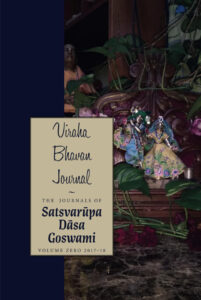
Viraha Bhavan Journal (2017–2018) was written by Satsvarūpa Mahārāja following a brief hiatus in writing activity, and was originally intended to be volume 1 in a series of published journals. However, following its completion and publication, Mahārāja again stopped writing books, subsequently focusing only on what became his current online journal, which began in August of 2018.
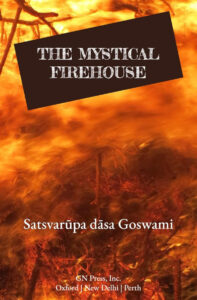
At first, I took it hard that I would have to live surrounded by the firemen, and without my own solitude. After all, for decades I had lived in my own house with my own books and my own friends. I was also now a crippled person who couldn’t walk, living among men who did active duties. But when Baladeva explained it to me, how it was not so bad living continually with other firemen and living in the firehouse with its limited facilities, I came to partially accept it and to accept the other men. I came to accept my new situation. I would live continually in the firehouse and mostly not go outside. I would not lead such a solitary life but associate with the other firemen.
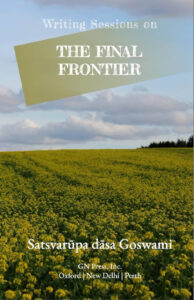
Let me write sweet prose.
Let me write not for my own benefit
but for the pleasure of Their Lordships.
Let me please Kṛṣṇa,
that’s my only wish.
May Kṛṣṇa be pleased with me,
that’s my only hope and desire.
May Kṛṣṇa give me His blessings:
Kṛṣṇa Kṛṣṇa Kṛṣṇa Kṛṣṇa Kṛṣṇa he
Rāma Rāghava Rāma Rāghava
Rāma Rāghava rakṣa mām.
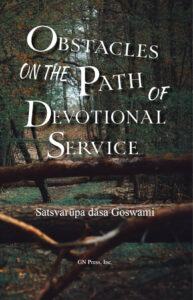
You mentioned that your pathway has become filled with stumbling blocks, but there are no stumbling blocks. I can kick out all those stumbling blocks immediately, provided you accept my guidance. With one stroke of my kick, I can kick out all stumbling blocks. —Letter by Śrīla Prabhupāda, December 9, 1972.
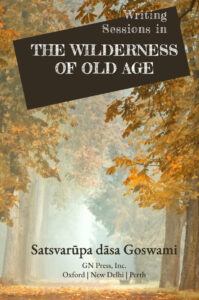
The Writing Sessions are my heart and soul. I’m trying my best to keep up with them. I am working with a few devotees, and they are far ahead of me. I wander in the wilderness of old age. I make my Writing Sessions as best I can. Every day I try to come up with a new subject. Today I am thinking of my parents. But I don’t think of them deeply. They are long gone from my life. Śrīla Prabhupāda wrote a poem when he was a sannyāsī, and he said now all my friends and relatives are gone. They are just a list of names now. I am like that too. I am a sannyāsī with a few friends. I love the books of Śrīla Prabhupāda. I try to keep up with them. I read as much as I can and then listen to his bhajanas.
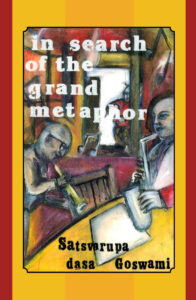
The metaphor is song. Explain it. Yes, particulars may not seem interesting or profound to readers who want structured books.
Wait a minute. Don’t pander to readers or concepts of Art. But Kṛṣṇa conscious criteria are important and must be followed. So, if your little splayed-out life-thoughts are all Kṛṣṇa conscious, then it’s no problem.
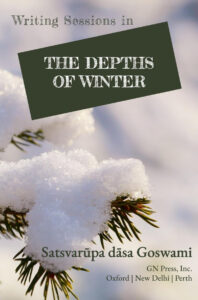
I am near the end of my days. But I do like the company of like-minded souls, especially those who are Kṛṣṇa conscious. Yes! I am prone to Kṛṣṇa consciousness. I have been a disciple of Bhaktivedanta Swami Prabhupāda for maybe almost sixty years. Sometimes I fail him. But I always bounce back and fall at his feet. It is a terrible thing that I sometimes do not have the highest love for him. It is a terrible thing. Actually, however, I never fall away from him. He always comes and catches me and brings me back to his loving arms.

This edition of Satsvarūpa dāsa Goswami’s 1996 timed book, Upstate: Room to Write, is published as part of a legacy project to restore Satsvarūpa Mahārāja’s writings to ‘in print’ status and make them globally available for current and future readers.
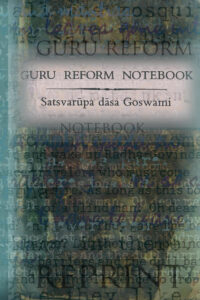
A factual record of the reform and change in ISKCON guru system of mid ’80s.
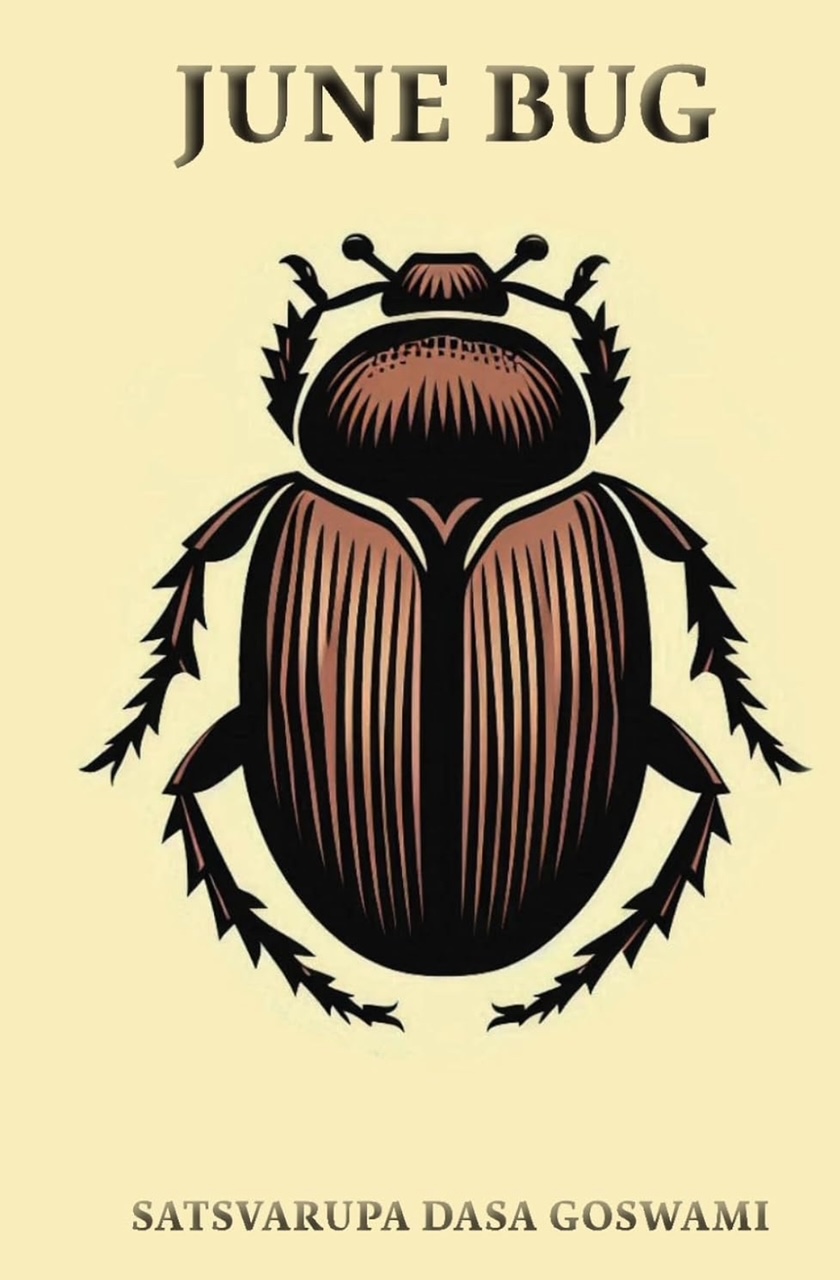
Readers will find, in the Appendix of this book, scans of a cover letter written by Satsvarūpa Mahārāja to the GN Press typist at the time, along with some of the original handwritten pages of June Bug. Together, these help to illustrate the process used by Mahārāja when writing his books during this period. These were timed books, in the sense that a distinct time period was allotted for the writing, during SDG’s travels as a visiting sannyāsī
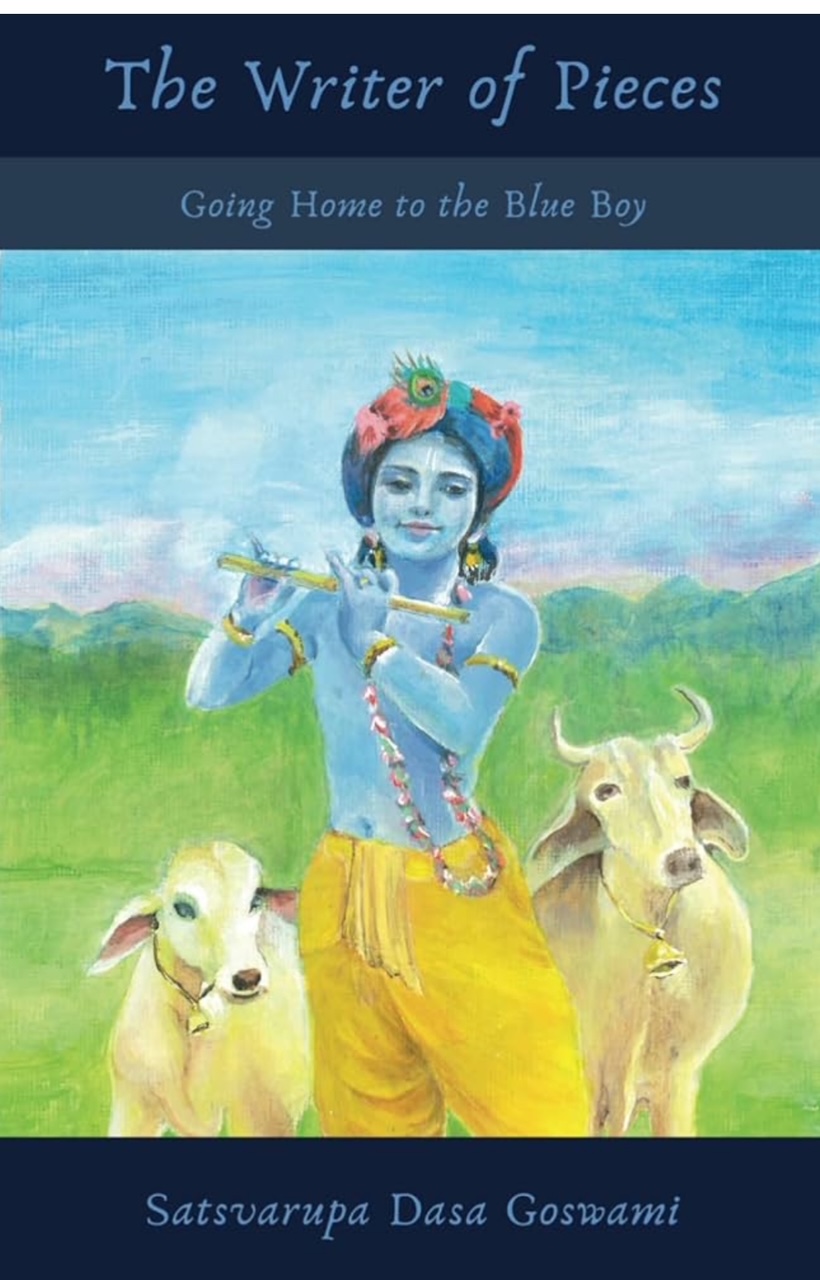
Don’t take my pieces away from me. I need them dearly. My pieces are my prayers to Kṛṣṇa. He wants me to have them, this is my way to love Him. Never take my pieces away.
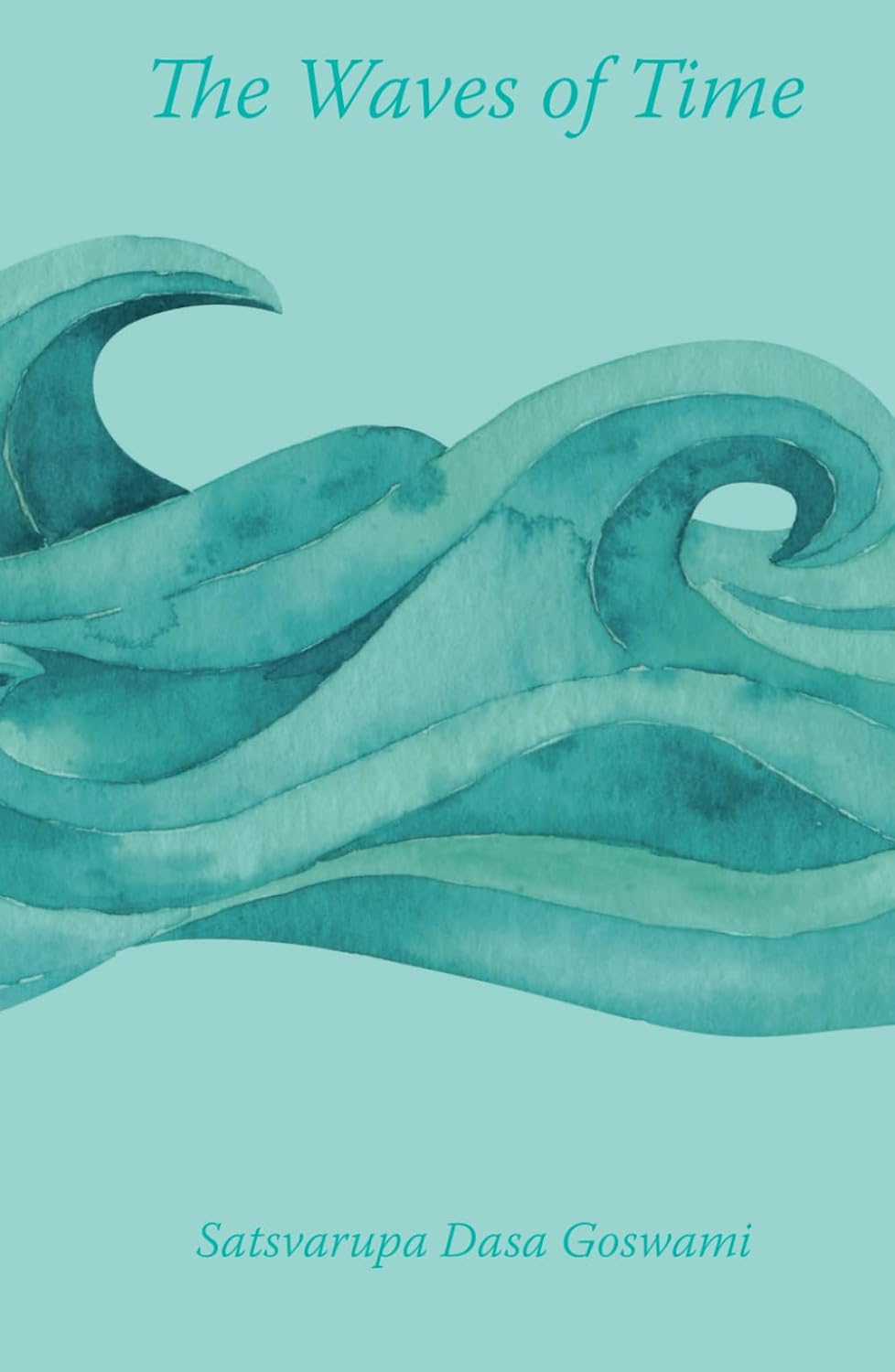
Many planks and sticks, unable to stay together, are carried away by the force of a river’s waves. Similarly, although we are intimately related with friends and family members, we are unable to stay together because of our varied past deeds and the waves of time.

To Śrīla Prabhupāda, who encouraged his devotees (including me) To write articles and books about Kṛṣṇa Consciousness.
I wrote him personally and asked if it was alright for his disciples to write books, Since he, our spiritual master, was already doing that. He wrote back and said that it was certainly alright For us to produce books.

I have a personal story to tell. It is a about a time (January–July 1974) I spent as a personal servant and secretary of my spiritual master, His Divine Grace A.C. Bhaktivedanta Swami Prabhupäda, founder-äcärya of the International Society for Krishna Consciousness. Although I have written extensively about Çréla Prabhupäda, I’ve hesitated to give this account, for fear it would expose me as a poor disciple. But now I’m going ahead, confident that the truth will purify both my readers and myself.

First published by The Gītā-nāgarī Press/GN Press in serialized form in the magazine Among Friends between 1996 and 2001, Best Use of a Bad Bargain is collected here for the first time in this new edition. This volume also contains essays written by Satsvarūpa dāsa Goswami for the occasional periodical, Hope This Meets You in Good Health, between 1994 and 2002, published by the ISKCON Health and Welfare Ministry.

This book has two purposes: to arouse our transcendental feelings of separation from a great personality, Śrīla Prabhupāda, and to encourage all sincere seekers of the Absolute Truth to go forward like an army under the banner of His Divine Grace A.C. Bhaktivedanta Swami Prabhupāda and the Kṛṣṇa consciousness movement.

A single volume collection of the Nimai novels.

Śrīla Prabhupāda was in the disciplic succession from the Brahmā-Mādhva-Gauḍīya sampradāya, the Vaiṣṇavas who advocate pure devotion to God and who understand Kṛṣṇa as the Supreme Personality of Godhead. He always described himself as simply a messenger who carried the paramparā teachings of his spiritual master and Lord Kṛṣṇa.

Dear Srila Prabhupada,
Please accept this or it’s worse than useless.
You have given me spiritual life
and so my time is yours.
You want me to be happy in Krishna consciousness
You want me to spread Krishna consciousness,

This collection of Satsvarūpa dāsa Goswami’s writings is comprised of essays that were originally published in Back to Godhead magazine between 1966 and 1978, and compiled in 1979 by Gita Nagari Press as the volume A Handbook for Kṛṣṇa Consciousness.

This second volume of Satsvarūpa dāsa Goswami’s Back to Godhead essays encompasses the last 11 years of his 20-year tenure as Editor-in-Chief of Back to Godhead magazine. The essays in this book consist mostly of SDG’s ‘Notes from the Editor’ column, which was typically featured towards the end of each issue starting in 1978 and running until Mahārāja retired from his duties as editor in 1989.

This collection of Satsvarupa dasa Goswami’s writings is comprised of essays that were originally published in Back to Godhead magazine between 1991 and 2002, picking up where Volume 2 leaves off. The volume is supplemented by essays about devotional service from issues of Satsvarupa dasa Goswami’s magazine, Among Friends, published in the 1990s.

“This is a different kind of book, written in my old age, observing Kṛṣṇa consciousness and assessing myself. I believe it fits under the category of ‘Literature in pursuance of the Vedic version.’ It is autobiography, from a Western-raised man, who has been transformed into a devotee of Kṛṣṇa by Śrīla Prabhupāda.”
 The Best I Could Do
The Best I Could DoI want to study this evolution of my art, my writing. I want to see what changed from the book In Search of the Grand Metaphor to the next book, The Last Days of the Year.
 a Hare Krishna Man
a Hare Krishna ManIt’s world enlightenment day
And devotees are giving out books
By milk of kindness, read one page
And your life can become perfect.
 Calling Out to Srila Prabhupada: Poems and Prayers
Calling Out to Srila Prabhupada: Poems and PrayersO Prabhupāda, whose purports are wonderfully clear, having been gathered from what was taught by the previous ācāryas and made all new; O Prabhupāda, who is always sober to expose the material illusion and blissful in knowledge of Kṛṣṇa, may we carefully read your Bhaktivedanta purports.

I use free-writing in my devotional service as part of my sādhana. It is a way for me to enter those realms of myself where only honesty matters; free-writing enables me to reach deeper levels of realization by my repeated attempt to “tell the truth quickly.” Free-writing takes me past polished prose. It takes me past literary effect. It takes me past the need to present something and allows me to just get down and say it. From the viewpoint of a writer, this dropping of all pretense is desirable.
 Geaglum Free Write
Geaglum Free WriteThis edition of Satsvarūpa dāsa Goswami’s 1996 timed book, Geaglum Free Write Diary, is published as part of a legacy project to restore Satsvarūpa Mahārāja’s writings to ‘in print’ status and make them globally available for current and future readers.